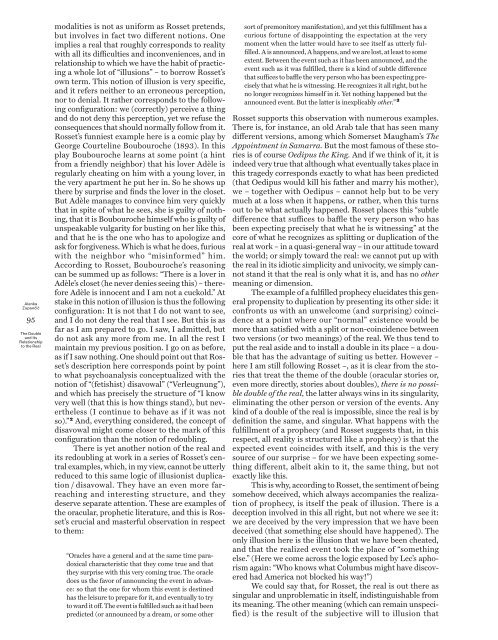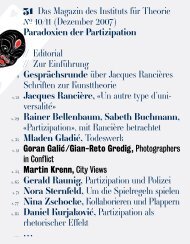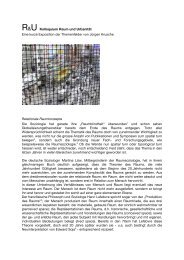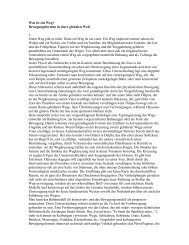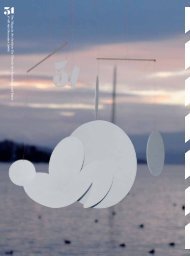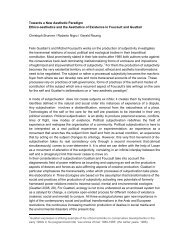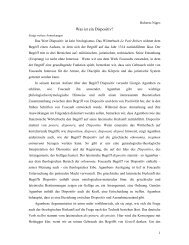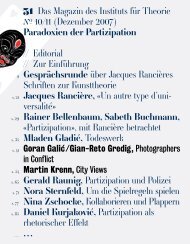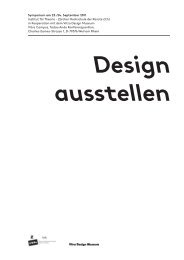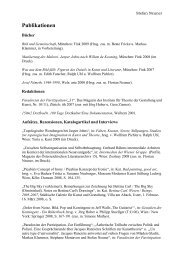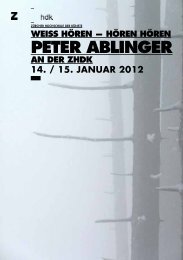Heft - Institut für Theorie ith
Heft - Institut für Theorie ith
Heft - Institut für Theorie ith
Erfolgreiche ePaper selbst erstellen
Machen Sie aus Ihren PDF Publikationen ein blätterbares Flipbook mit unserer einzigartigen Google optimierten e-Paper Software.
Alenka<br />
Zupančič<br />
95<br />
The Double<br />
and Its<br />
Relationship<br />
to the Real<br />
modalities is not as uniform as Rosset pretends,<br />
but involves in fact two di≠erent notions. One<br />
implies a real that roughly corresponds to reality<br />
w<strong>ith</strong> all its di∞culties and inconveniences, and in<br />
relationship to which we have the habit of practicing<br />
a whole lot of “illusions” – to borrow Rosset’s<br />
own term. This notion of illusion is very specific,<br />
and it refers ne<strong>ith</strong>er to an erroneous perception,<br />
nor to denial. It rather corresponds to the following<br />
configuration: we (correctly) perceive a thing<br />
and do not deny this perception, yet we refuse the<br />
consequences that should normally follow from it.<br />
Rosset’s funniest example here is a comic play by<br />
George Courteline Boubouroche (1893). In this<br />
play Boubouroche learns at some point (a hint<br />
from a friendly neighbor) that his lover Adèle is<br />
regularly cheating on him w<strong>ith</strong> a young lover, in<br />
the very apartment he put her in. So he shows up<br />
there by surprise and finds the lover in the closet.<br />
But Adèle manages to convince him very quickly<br />
that in spite of what he sees, she is guilty of nothing,<br />
that it is Boubouroche himself who is guilty of<br />
unspeakable vulgarity for busting on her like this,<br />
and that he is the one who has to apologize and<br />
ask for forgiveness. Which is what he does, furious<br />
w<strong>ith</strong> the neighbor who “misinformed” him.<br />
According to Rosset, Boubouroche’s reasoning<br />
can be summed up as follows: “There is a lover in<br />
Adèle’s closet (he never denies seeing this) – therefore<br />
Adèle is innocent and I am not a cuckold.” At<br />
stake in this notion of illusion is thus the following<br />
configuration: It is not that I do not want to see,<br />
and I do not deny the real that I see. But this is as<br />
far as I am prepared to go. I saw, I admitted, but<br />
do not ask any more from me. In all the rest I<br />
maintain my previous position. I go on as before,<br />
as if I saw nothing. One should point out that Rosset’s<br />
description here corresponds point by point<br />
to what psychoanalysis conceptualized w<strong>ith</strong> the<br />
notion of “(fetishist) disavowal” (“Verleugnung”),<br />
and which has precisely the structure of “I know<br />
very well (that this is how things stand), but nevertheless<br />
(I continue to behave as if it was not<br />
so).” 2 And, everything considered, the concept of<br />
disavowal might come closer to the mark of this<br />
configuration than the notion of redoubling.<br />
There is yet another notion of the real and<br />
its redoubling at work in a series of Rosset’s central<br />
examples, which, in my view, cannot be utterly<br />
reduced to this same logic of illusionist duplication<br />
/ disavowal. They have an even more farreaching<br />
and interesting structure, and they<br />
deserve separate attention. These are examples of<br />
the oracular, prophetic literature, and this is Rosset’s<br />
crucial and masterful observation in respect<br />
to them:<br />
“Oracles have a general and at the same time paradoxical<br />
characteristic that they come true and that<br />
they surprise w<strong>ith</strong> this very coming true. The oracle<br />
does us the favor of announcing the event in advance:<br />
so that the one for whom this event is destined<br />
has the leisure to prepare for it, and eventually to try<br />
to ward it o≠. The event is fulfilled such as it had been<br />
predicted (or announced by a dream, or some other<br />
sort of premonitory manifestation), and yet this fulfillment has a<br />
curious fortune of disappointing the expectation at the very<br />
moment when the latter would have to see itself as utterly fulfilled.<br />
A is announced, A happens, and we are lost, at least to some<br />
extent. Between the event such as it has been announced, and the<br />
event such as it was fulfilled, there is a kind of subtle di≠erence<br />
that su∞ces to baffle the very person who has been expecting precisely<br />
that what he is witnessing. He recognizes it all right, but he<br />
no longer recognizes himself in it. Yet nothing happened but the<br />
announced event. But the latter is inexplicably other.” 3<br />
Rosset supports this observation w<strong>ith</strong> numerous examples.<br />
There is, for instance, an old Arab tale that has seen many<br />
di≠erent versions, among which Somerset Maugham’s The<br />
Appointment in Samarra. But the most famous of these stories<br />
is of course Oedipus the King. And if we think of it, it is<br />
indeed very true that although what eventually takes place in<br />
this tragedy corresponds exactly to what has been predicted<br />
(that Oedipus would kill his father and marry his mother),<br />
we – together w<strong>ith</strong> Oedipus – cannot help but to be very<br />
much at a loss when it happens, or rather, when this turns<br />
out to be what actually happened. Rosset places this “subtle<br />
di≠erence that su∞ces to baffle the very person who has<br />
been expecting precisely that what he is witnessing” at the<br />
core of what he recognizes as splitting or duplication of the<br />
real at work – in a quasi-general way – in our attitude toward<br />
the world; or simply toward the real: we cannot put up w<strong>ith</strong><br />
the real in its idiotic simplicity and univocity, we simply cannot<br />
stand it that the real is only what it is, and has no other<br />
meaning or dimension.<br />
The example of a fulfilled prophecy elucidates this general<br />
propensity to duplication by presenting its other side: it<br />
confronts us w<strong>ith</strong> an unwelcome (and surprising) coincidence<br />
at a point where our “normal” existence would be<br />
more than satisfied w<strong>ith</strong> a split or non-coincidence between<br />
two versions (or two meanings) of the real. We thus tend to<br />
put the real aside and to install a double in its place – a double<br />
that has the advantage of suiting us better. However –<br />
here I am still following Rosset –, as it is clear from the stories<br />
that treat the theme of the double (oracular stories or,<br />
even more directly, stories about doubles), there is no possible<br />
double of the real, the latter always wins in its singularity,<br />
eliminating the other person or version of the events. Any<br />
kind of a double of the real is impossible, since the real is by<br />
definition the same, and singular. What happens w<strong>ith</strong> the<br />
fulfillment of a prophecy (and Rosset suggests that, in this<br />
respect, all reality is structured like a prophecy) is that the<br />
expected event coincides w<strong>ith</strong> itself, and this is the very<br />
source of our surprise – for we have been expecting something<br />
di≠erent, albeit akin to it, the same thing, but not<br />
exactly like this.<br />
This is why, according to Rosset, the sentiment of being<br />
somehow deceived, which always accompanies the realization<br />
of prophecy, is itself the peak of illusion. There is a<br />
deception involved in this all right, but not where we see it:<br />
we are deceived by the very impression that we have been<br />
deceived (that something else should have happened). The<br />
only illusion here is the illusion that we have been cheated,<br />
and that the realized event took the place of “something<br />
else.” (Here we come across the logic exposed by Lec’s aphorism<br />
again: “Who knows what Columbus might have discovered<br />
had America not blocked his way!”)<br />
We could say that, for Rosset, the real is out there as<br />
singular and unproblematic in itself, indistinguishable from<br />
its meaning. The other meaning (which can remain unspecified)<br />
is the result of the subjective will to illusion that


